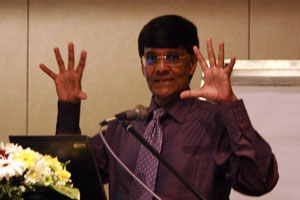
Prof Mohan Munasinghe |
Climate change by 2100 could turn into catastrophic proportions if surprises take place like melting of polar ice sheets that would raise the sea level by several metres and not by centimeters as predicted earlier - which then would submerge large portons of land in countries like Bangladesh.
This frightening scenario came from Prof Mohan Munasinghe, co-chair of the Intergovernmental Panel on Climate Change (IPCC) and Co-Laureate of the 2007 Noble Prize for Peace, speaking on “Integrating Climate Change Policies into Sustainable Development Strategy in Sri Lanka – Role of Business” at the Sunday Times Business Club last week.
He said that there would be increased risk of floods potentially displacing tens of millions of people due to sea level rise and heavy rainfall events, especially in small island states and low lying areas.
He said Bangladesh is projected to lose about 17% of its area with sea level rise of one metre. Economic damage will continue to increase due to extreme weather events. He said that due to the weather and flood catastrophes the economic losses over the last 40 years would be around $250 billion.
Prof Munasinghe noted that multiple global crises undermine Sustainable Development (SD) prospects and unfairly penalize the poor and climate change is the ultimate threat multiplier which will worsen all other problems.
He said billions live without their basic needs and there is unequal income distribution with scarce resources, conflict and competition affecting energy, water, land, food, etc. Some 1.3 billion live on less than one dollar per day and three billion people live on less than two dollars per day, 800 million are malnourished and during the next 35 years production should have to be doubled to feed the hungry mouths in the world.
He said climate change is likely to impact disproportionately the poorest countries and the poorest persons within all countries, exacerbating inequities in health status and access to adequate food, clean water and other resources.
He said the stark reality is that the richest fifth (20 %) of the world population receives 82.7% of the world’s income while only a mere 1.4 % is received by the poorest of the total world population. The club is hosted by the Cinnamon Grand Hotel and co sponsored by Hameedia.
|

